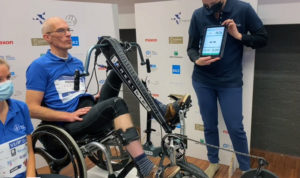Cybathlon 2020 comes to a close
By ETH Zurich Staff
The 2020 Cybathlon wrapped up this past Saturday despite having to accommodate the teams virtually due to the continuing pandemic.
In total, 51 teams from 20 countries competed against each other, completing everyday tasks with the help of state-of-the-art assistance systems. Due to the Covid-19 pandemic, the teams competed for the first time in different time zones and locations.
Each competitor had three hours in which to make three attempts at an obstacle course, with the best attempt counting towards their result. Race results and winners were not revealed – even to the teams themselves – before the Cybathlon organizers streamed the races in the live event.

The Cybathlon consists of six disciplines for humans and their machines: a virtual race with mind-controlled tasks, a bike race with electronic muscle stimulation and obstacle courses for those racing with arm prostheses, leg prostheses, robotic exoskeletons and motorized wheelchairs.
Between five and 13 teams competed for the win in each discipline. Switzerland sent a total of ten teams to the competition, five of which have ties to ETH Zurich. Teams from the same country competed in the hubs at different times.
In Switzerland, two hubs were used: one in Zurich at ETH Zurich’s Hönggerberg campus and one at EPFL. Official Cybathlon referees were on site to enforce the rules and judge the attempts at all race venues around the world.
Rolf Schoch, an exoskeleton pilot on Team VariLeg Enhanced 2, succeeded in setting a personal record. “Organizing the event in this way was the best option considering the situation,” says Schoch. “Although I missed the atmosphere of having a live audience, it made me a bit more focused.”
Overcoming obstacles – in society too
“Universities have social responsibilities,” says Joël Mesot, president of ETH Zurich. “Technology should serve people – not the other way around. The Cybathlon is a particularly impressive example of how humans and technology can create unity.”
The spectators are sure to have experienced plenty of emotional moments at the Cybathlon. Roland Sigrist, the Cybathlon’s Executive Director, believes one factor is particularly important: “The teams are not only competing to win the Cybathlon, they’re also helping to improve assistive technologies for people with disabilities.”
The Cybathlon was started by ETH Zurich with the aim of placing people at the center when developing assistive technologies. The competition provides a forum in which people with physical disabilities, technology developers, and the public can interact. Cybathlon not only raises awareness, but also stimulates global synergies to further the current state of technology and promote inclusion.
More than 70 people were involved in the planning and implementation of this year’s virtual Cybathlon. The uncertainty due to the pandemic was a challenge that required the organizers to remain flexible.
“We are proud of how we managed to quickly find a suitable platform for hosting the Cybathlon for all the participants, allowing them to demonstrate their skills and technological advancements,” says Cybathlon executive director, Roland Sigrist.
For final results, visit Cybathlon online.